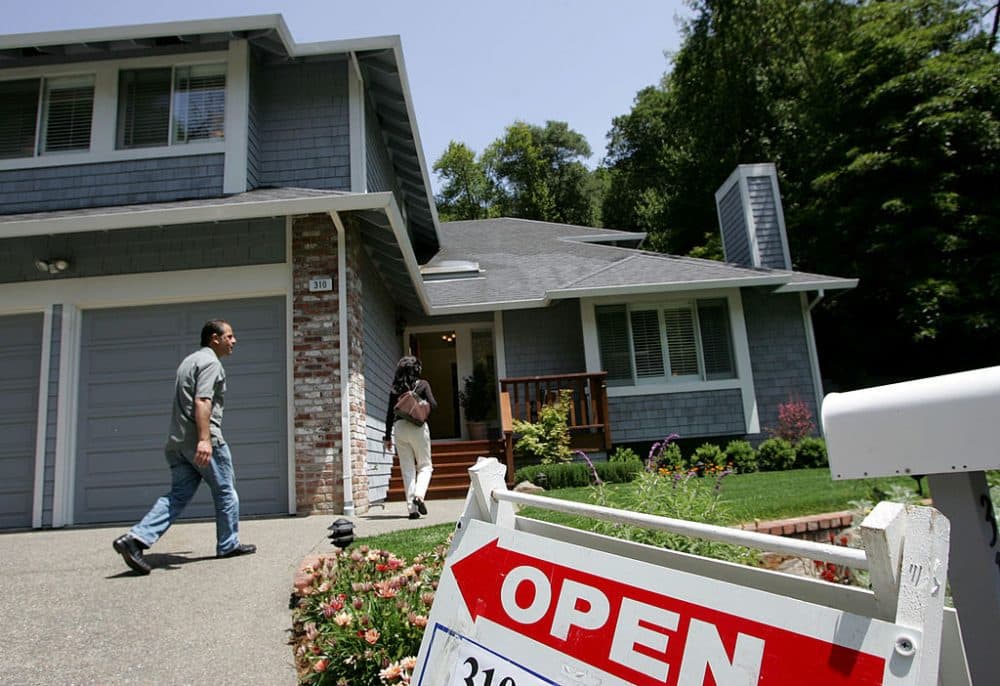Advertisement
Mortgage Refinancing Jumps As The 'Brexit Bonus' Causes Rates To Fall
Resume
Plunging mortgage interest rates have led to a surge in mortgage refinancing. It's being called the "Brexit bonus" for American homeowners. The Mortgage Bankers Association reports that total mortgage application volume is 66 percent higher than a year ago, and refinancing applications jumped 21 percent for the week.
Here & Now's Jeremy Hobson talks with CNN's Maggie Lake about what Brexit means for the housing industry.
Interview Highlights: Maggie Lake
On how low interest rates are:
They are low. Have you seen those happy real estate people staking the open houses in your neighborhood? You know you have. 3.3 percent is what on I saw today on our CNNMoney website for a fixed 30 year. Lowest in three years. But you are right. Those are near historic lows. The reason we have interest rates dropping is that you have a lot of uncertainty in the world. Basically investors are nervous about what Britain exiting the European Union means, the Brexit we're all talking about. The Chinese economy and currency. And they're nervous about what all of this means for U.S. corporate profits.
When investors are nervous, especially investors around the world, they flock to the safety of gold and government bonds, particularly U.S. government bonds, and when that happens you see the price go up and the yield go down and that's what interest rates are benchmarked against. So that is why you are seeing this downward pressure on rates here and that's reflected in mortgage rates.
On the chance interest rates go lower:
Listen, there's a chance that they could go lower. We're in a very unusual situation where you have some countries around the world that have negative interest rates. That means investors are paying them to hold onto them. They're not even making any money off them. Now, people don't think that's going to happen here but certainly you could see them start to inch down even lower.
On what this means for the housing market:
It means, especially if you're looking to buy a home, it's good news. It's going to lend support to this sector which has been improving. Now obviously you see it most markedly in refinancing. Home sales and regular mortgage applications are also seeing a boost. You have a couple of factors which are keeping a little bit of a lid on that department. Even though you have the low rates, that's what's motivating people to get out there, I mentioned all those happy real estate people you see, but that means inventory's low. Houses are going when they're on the market. Prices are getting pushed up with all of that demand. Remember, you still have tighter lending requirements post-financial crisis. So even though housing is strong, you still have to qualify for that mortgage, so it's keeping a little bit of a lid on that sector of the market. But refinancing as you mention is really exploding as a result of this.
On needing good credit to refinance:
That is exactly right. And that is why those with the best credit, once again, are benefiting from this, those that are a little bit down the food chain who probably need the most help from needing to refi, they may not be able to qualify. Doesn't mean they won't, and you should probably try after you talk to your financial adviser to see if you can. It doesn't mean you won't be able to. But obviously those with the best credit in this kind of environment are going to benefit the most from this drop in interest rates.
On what the experts say if you're thinking about refinancing:
I think any expert would tell that if you think that you can and it's going to help your balance then you should look into it, right? You can always have someone run the numbers for you and see if you qualify. There are always costs associated with it. So you have to talk all that into account which is why you should talk to a financial expert or a bank, certainly your local banker.
The other thing is, this is an unusual situation. No one expected interest rates to be this low right now, and a lot of this is being influenced by the global economy. You said, “Can they go lower?” Yes. Does it mean they're going to stay here? Not necessarily. So you probably do want to see if you are able to take advantage of this time right now.
What do people think about the overall economy right now?
I think experts are really divided about this. When rates are low, it doesn't benefit anyone if you don't have a job or you're uncertain about the future. And if that is what happens as a result of this uncertainty, then that is going to be a problem. Right now, a lot of people think the U.S. economy is sheltered, to an extent, of what is happening globally, from Brexit for example but the Federal Reserve is watching this really closely. As we know, we are all interconnected. Right now, it looks like we have a great scenario, that Goldilocks low interest rates. We have an important jobs report Friday that's going to shed a lot of light on that.
Guest
Maggie Lake, CNN Money. She tweets @maggielake.
This segment aired on July 6, 2016.